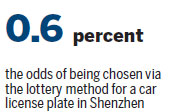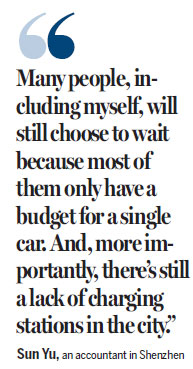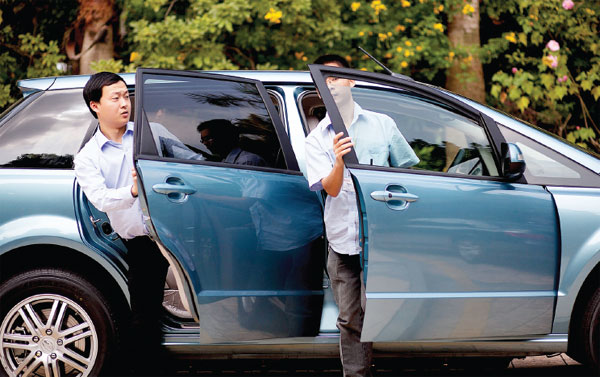Push to green Shenzhen at the wheel
Updated: 2016-06-03 07:42
By zhou mo in Shenzhen(HK Edition)
|
|||||||
City authorities step up incentives for drivers turning to electric cars
Shenzhen has taken another step forward in promoting electric cars on the roads in an attempt to stifle the public's lukewarm response to the use of the environmentally friendly vehicles.
From this month, applications for vehicle license plates are categorized into three types - electric cars, hybrid electric cars and gasoline-powered cars. Previously, electric cars and hybrid electric cars were combined as one category.
An official with the Transport Commission of Shenzhen Municipality said the move is aimed at encouraging more people to buy electric cars, with incentives for those applying for electric-car licenses.
The Shenzhen government has set no quota limit for the purchase of electric or hybrid electric cars. Qualified applicants can obtain license plates directly.

For gasoline-car applicants, however, only 80,000 license plates are issued each year, either through a lottery or bidding system, and getting one is becoming increasingly difficult. Last month, nearly 500,000 people applied for licenses via the lottery method, but only 2,933 license plates were issued, which means only six among 1,000 people were successful. The bidding was fierce, with average bidding prices hitting almost 46,000 yuan ($7,000).
Despite the obstacles, the enthusiasm for electric cars has been low among Shenzhen residents, and the government has introduced various measures in a bid to improve the situation.
In August last year, the local government eased its policy on applications for electric-car licenses. People who already own a car in Shenzhen are allowed to apply while, previously, only those who do not own a car in the city were allowed to apply.

The change in policy has solicited an immediate response, with the number of applications that month surging by about 50 percent.
Further incentives were introduced a month later, with residents still being allowed to apply for a gasoline-car license even after they have bought an electric car.
"The move shows that the government is trying hard to reduce the cost of buying electric cars for residents," said Sun Yu, an accountant at a clothing company in Shenzhen who has been bidding for a license for six months.
"Although buying an electric car will not affect a person's application for a gasoline vehicle, many people, including myself, will still choose to wait because most of them only have a budget for a single car. And, more importantly, there's still a lack of charging stations in the city."
According to local media reports, there were only 200 charging stations in Shenzhen by the end of last year, of which 160 were for buses and the rest for private vehicles.
Some Shenzhen residents believe the crucial point in promoting the growth of electric-car use lies in eliminating people's misunderstanding, and raising awareness of electric cars, rather than offering incentives.
"Many people have a deep misunderstanding of electric cars, saying they could be harmful to health due to the high degree of radiation," said Hu Minghui, a car driver with more than 10 years' experience on the roads.
"Incentives may have a positive effect for a certain period, but only when people are willing to accept electric cars can the situation be fundamentally improved."
sally@chinadailyhk.com
|
Electric cars are poised to catch on in Shenzhen. The city's authorities are boosting incentives for people to buy electric cars. But the acute shortage of charging stations has deterred many drivers from using these vehicles. Forbes Conrad / Bloomberg |
(HK Edition 06/03/2016 page6)
